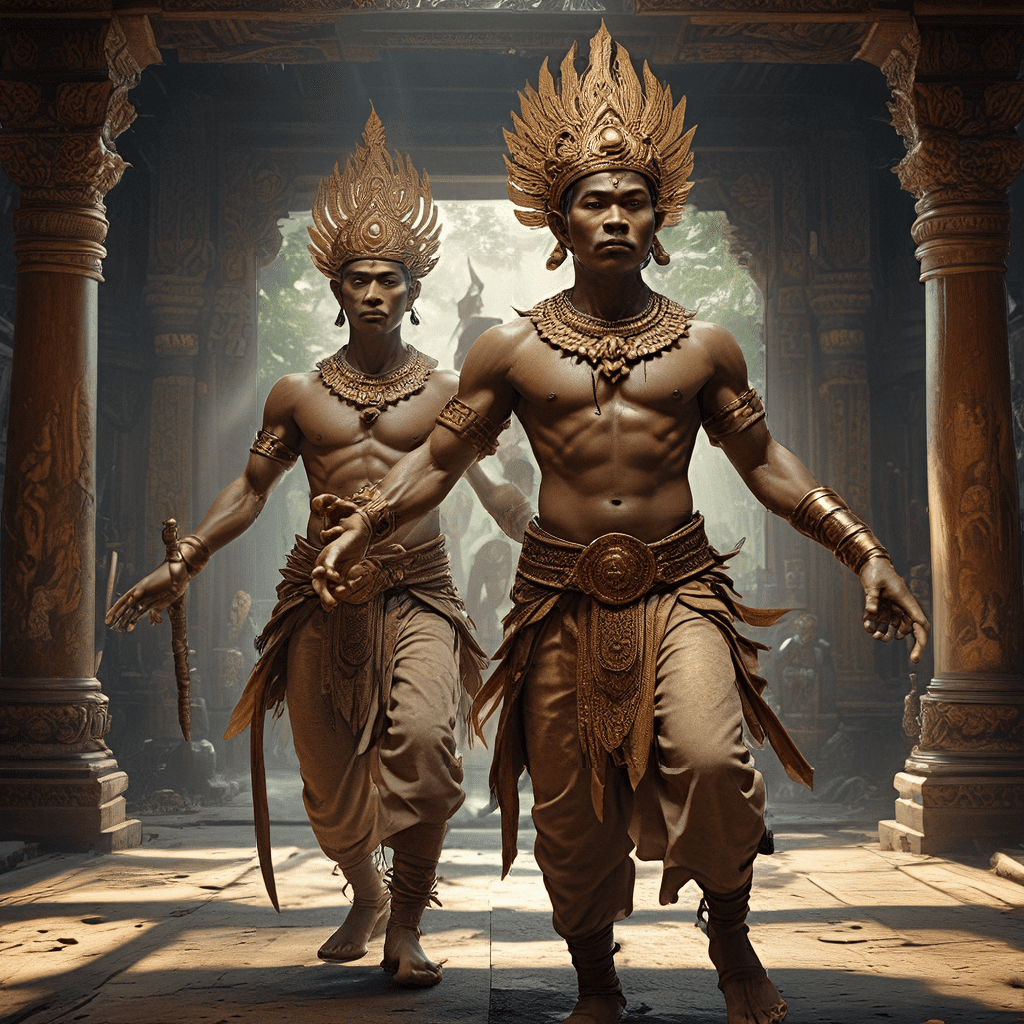Indonesian Mythology: A Tapestry of Beliefs and Legends
Indonesian mythology is a rich and vibrant tapestry, woven with threads of ancient beliefs, folklore, and spiritual practices. This diverse collection of myths and legends reflects the history and cultural identity of the Indonesian people, offering insights into their values, beliefs, and worldview. Across generations, these stories have served as a powerful means of transmitting cultural knowledge, moral lessons, and spiritual wisdom. From the mystical tales of gods and goddesses to the adventurous exploits of heroes and heroines, Indonesian mythology is alive with wonder, adventure, and profound spiritual meaning. The intricate interplay of animistic beliefs, Hinduism, Buddhism, and Islam has shaped the mythology, adding layers of complexity and depth to the stories.
Redemption and Forgiveness: Cornerstones of Indonesian Mythology
While Indonesian mythology is diverse, a common thread running through many of the tales is the enduring theme of redemption and forgiveness. These concepts are deeply ingrained in the Indonesian worldview, reflecting the belief in the inherent goodness of humanity and the possibility of transformation. Redemption is often depicted as a journey of self-discovery, a process of overcoming past mistakes and finding inner peace. Forgiveness, on the other hand, is seen as a vital force for healing and reconciliation, paving the way for a more harmonious society.
These themes are not merely abstract concepts but are vividly illustrated through the actions of gods, heroes, and ordinary people in the myths. The stories often portray the consequences of wrongdoings and the importance of seeking atonement. They also emphasize the power of compassion, empathy, and understanding in fostering reconciliation and healing.
The Myth of Batara Kala: A Story of Transformation and Second Chances
One of the most compelling examples of redemption in Indonesian mythology is the story of Batara Kala. This powerful demon, once a trusted guardian of the gods, was cast out from heaven after attempting to steal the elixir of immortality. His fall from grace was a result of his own insatiable greed and ambition. However, despite his transgression, Batara Kala still yearned for redemption. He sought to appease the gods through acts of self-sacrifice and penance, ultimately gaining forgiveness and a new role as the protector of the underworld. His story highlights the power of transformation and the possibility of second chances, even for those who have strayed from the path of righteousness.
The Legend of Sang Hyang Tunggal: A Symbol of Universal Forgiveness
Another prominent figure in Indonesian mythology who embodies the concept of forgiveness is Sang Hyang Tunggal, a divine being representing the supreme power of the universe. Sang Hyang Tunggal is believed to be the source of all creation and the ultimate symbol of love, compassion, and forgiveness. In many myths, Sang Hyang Tunggal is depicted as a benevolent figure who constantly forgives the transgressions of humans and offers them a path towards enlightenment. The legend of Sang Hyang Tunggal emphasizes the boundless nature of divine forgiveness and the importance of seeking spiritual guidance from a higher power.
The Role of Spirits and Ancestors in Indonesian Beliefs
The belief in spirits and ancestors plays a significant role in Indonesian mythology, adding another dimension to the concepts of redemption and forgiveness. Spirits are believed to inhabit the natural world, connecting humans to the spiritual realm. They can be benevolent or malevolent, depending on how they are treated and whether they have been appeased. Ancestors are revered as guardians and protectors, their spirits believed to be present in the community, guiding and influencing the living.
The spirits of ancestors can also be appeased through rituals and offerings, seeking forgiveness for any wrongdoings committed by the living. This practice reinforces the belief in a interconnectedness between the living and the dead, emphasizing the importance of respecting the past and maintaining harmony with the spiritual realm. The belief in ancestral spirits highlights the intergenerational aspect of redemption, recognizing the impact of past actions on present and future generations.
The Concept of Karma and its Impact on Redemption
Indonesian mythology is deeply influenced by the concept of karma, a fundamental principle in both Hinduism and Buddhism. Karma refers to the law of cause and effect, suggesting that every action, whether good or bad, creates consequences that will eventually manifest themselves in the future. This principle emphasizes the importance of living a virtuous life, as good deeds will lead to positive outcomes, while negative actions will result in suffering.
The belief in karma provides a framework for understanding the interconnectedness of all beings and the universal consequences of actions. It underscores the fact that we are not isolated individuals, but rather integral parts of a larger web of existence. Furthermore, karma offers a perspective on redemption, as it suggests that through conscious effort and positive actions, individuals can gradually transform their karma, reducing the weight of past negativity and creating a more favorable future.
The Importance of Rituals and Offerings in Seeking Forgiveness
Indonesian mythology emphasizes the significance of rituals and offerings in seeking forgiveness and achieving redemption. These practices are seen as a way of acknowledging wrongdoing, expressing remorse, and appeasing both human and spiritual beings. Offerings can include food, flowers, incense, or other valuable items, depending on the specific tradition and purpose of the ritual.
These rituals are often performed at sacred sites or temples, involving prayers, chants, and symbolic gestures. They provide a space for individuals to connect with the divine and seek guidance and forgiveness. The act of offering something valuable demonstrates a willingness to make amends and expresses a sincere desire for redemption. Rituals also serve to strengthen the connection between humans and the spiritual world, helping to restore balance and harmony.
The Influence of Hinduism and Buddhism on Indonesian Mythology
The influence of Hinduism and Buddhism is evident in many aspects of Indonesian mythology, including the concepts of redemption and forgiveness. The arrival of Hinduism in Indonesia around the 1st century AD introduced concepts like the cycle of rebirth, karma, and the importance of achieving liberation from suffering. These ideas were absorbed and integrated into existing beliefs, shaping the mythology and influencing the worldview of the people.
Subsequently, Buddhism also arrived and played a significant role in shaping Indonesian culture. Buddhist teachings on compassion, non-violence, and the pursuit of enlightenment resonated with existing beliefs and further solidified the emphasis on ethical conduct, moral responsibility, and the possibility of transformation. These influences can be seen in the stories of gods and goddesses, heroes and heroines, and the overall moral framework of the mythology.
Theories on the Origins and Evolution of Indonesian Mythology
Understanding the origins and evolution of Indonesian mythology is a complex endeavor, as it involves a complex interplay of indigenous beliefs, cultural influences, and historical events. Scholars suggest that the earliest forms of Indonesian mythology were likely based on animistic beliefs, recognizing the spirit world and the interconnectedness of nature.
The arrival of Hinduism and Buddhism brought new ideas and narratives that were incorporated into existing beliefs, leading to the creation of a rich and multifaceted mythology. This process of assimilation and innovation continued over centuries, as different cultural influences and historical events shaped the stories and interpretations. While the origins of specific myths may be obscure, the enduring themes of redemption and forgiveness offer a glimpse into the enduring values and beliefs of the Indonesian people.
Modern Interpretations of Redemption and Forgiveness in Indonesian Culture
While Indonesian mythology has ancient roots, the themes of redemption and forgiveness continue to resonate with modern audiences. These concepts are still relevant in contemporary Indonesian society, providing a framework for understanding human behavior, navigating relationships, and resolving conflicts.
The stories of gods, heroes, and everyday individuals facing challenges and seeking atonement inspire reflection and personal growth. Many Indonesians continue to draw upon these stories for guidance and inspiration, seeking meaning and purpose in their own lives. The enduring power of these myths demonstrates the enduring influence of tradition and the timeless relevance of themes like forgiveness and redemption.
FAQ:
Q: What is the significance of redemption and forgiveness in Indonesian mythology?
A: These themes are central to Indonesian mythology, reflecting the belief in the inherent goodness of humanity and the possibility of transformation.
Q: How do the myths illustrate the concept of redemption?
A: Stories like Batara Kala's journey from demon to protector of the underworld showcase how individuals can overcome past mistakes and find a path to redemption.
Q: What is the role of rituals and offerings in Indonesian beliefs?
A: Rituals and offerings are used to seek forgiveness, appease spirits, and restore harmony between humans and the spiritual world.
Q: How have Hinduism and Buddhism influenced Indonesian mythology?
A: These religions brought concepts of karma, rebirth, and compassion, which were integrated into existing beliefs, shaping the mythology's moral framework.
Q: Are the themes of redemption and forgiveness relevant to modern Indonesian society?
A: Yes, these themes continue to resonate with people, providing guidance and inspiration for personal growth and navigating relationships.



